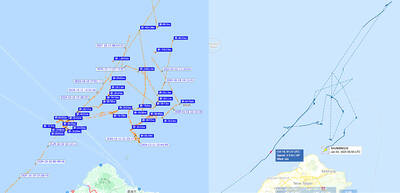The government is aiming to make Taiwan the dominant player in the global semiconductor supply chain, with annual output topping NT$2.66 trillion (US$82.9 billion) by 2028, the Executive Yuan said yesterday.
The goal was set to fulfill President William Lai’s (賴清德) pledge of developing five “trusted industry sectors,” semiconductors, artificial intelligence (AI), defense, cybersecurity and surveillance, and next-generation communications.
The National Development Council has been charged with formulating action plans to meet those pledges, which were approved at the weekly Cabinet meeting yesterday.

Photo: Sam Yeh, AFP
“The development of the five trusted industry sectors is President Lai’s national policy vision and has strategic significance,” Executive Yuan acting spokeswoman Julia Hsieh (謝子涵) quoted Premier Cho Jung-tai (卓榮泰) as saying.
“Not only would that bolster Taiwan’s status in the global supply chain, as well as links to the nation’s democratic allies, but it would also help every industry in the nation maintain its competitiveness. It is also the key to creating high-paying jobs, and enhancing national security and resilience,” she said.
The goal of developing the semiconductor industry is to solidify Taiwan’s No. 1 status in the foundry and packaging and testing industry, and become one of the world’s top two nations in integrated circuit design, the council said.
By 2028, half of the chips produced in Taiwan should be using advanced manufacturing processes, it said.
Output values generated by semiconductor material and chip manufacturing equipment industries should increase by NT$52.8 billion and NT$80 billion respectively, the council said.
The overall output of the semiconductor industry is expected to be NT$2.66 trillion by 2028, creating 250,000 high-paying jobs, it added.
The government has also set a goal of generating more than NT$1 trillion by 2026 through the development of the AI industry, the council said, adding that 200,000 AI specialists would be trained within four years.
The application rates of AI systems in the digital economy and manufacturing industries should be increased by 50 percent and 30 percent respectively, the council said.
A smart and energy-conserving data center would be built to enhance Taiwan’s influence in the global AI industry, it said.
Regarding the defense industry, the government aims to become the first democratic supply chain center for drones in the Asia-Pacific region, with annual output value growing 10-fold to reach NT$30 billion by 2028, the council said.
The drone manufacturing industry should be capable of quickly raising monthly drone production capacity by 150,000 units should there be a rise in short-term demand, it said.
For the development of the aerospace industry, a production line for engine forgings would be established, the council said.
By 2028, 165 new sea vessels for the navy and Coast Guard Administration would be delivered, the council said.
To build a nationwide resilient next-generation communication network, the government plans to support the research and development of base stations for 6G communication technology, with 80 percent of the hardware and software being made in Taiwan, the council said.
Taiwan would also be able to develop and manufacture ground communications equipment for low Earth orbit satellites, with 80 percent of key communication components being manufactured domestically, the council said.
The nation is aiming to launch its first B5G low Earth orbit satellite in 2027 as part of the initiative to build out a satellite communication system, it said.
Other goals include developing cybersecurity and surveillance technology industries with generated output values of NT$100 billion and NT$30 billion respectively.
The Executive Yuan yesterday also approved a Ministry of the Interior plan to train 50,000 disaster-prevention specialists as part of a government initiative to bolster rescue capacity in the private sector.
A study on the Great Hanshin Earthquake that occurred in Japan’s Hyogo Prefecture on Jan. 17, 1995, showed that 34.9 percent of people escaped from disasters caused by the earthquake on their own, while 31.9 percent were able to do so with the help of family members.
About 28 percent said they escaped through assistance from neighbors and friends, Minister of the Interior Liu Shyh-fang (劉世芳) said.
“The experience has caused many governments to begin strengthening the self-help and mutual assistance capabilities among civilians in times of natural disasters, aside from governments’ disaster-prevention capacity,” Liu said.

DEEPER REVIEW: After receiving 19 hospital reports of suspected food poisoning, the Taipei Department of Health applied for an epidemiological investigation A buffet restaurant in Taipei’s Xinyi District (信義) is to be fined NT$3 million (US$91,233) after it remained opened despite an order to suspend operations following reports that 32 people had been treated for suspected food poisoning, the Taipei Department of Health said yesterday. The health department said it on Tuesday received reports from hospitals of people who had suspected food poisoning symptoms, including nausea, vomiting, stomach pain and diarrhea, after they ate at an INPARADISE (饗饗) branch in Breeze Xinyi on Sunday and Monday. As more than six people who ate at the restaurant sought medical treatment, the department ordered the

A strong continental cold air mass and abundant moisture bringing snow to mountains 3,000m and higher over the past few days are a reminder that more than 60 years ago Taiwan had an outdoor ski resort that gradually disappeared in part due to climate change. On Oct. 24, 2021, the National Development Council posted a series of photographs on Facebook recounting the days when Taiwan had a ski resort on Hehuanshan (合歡山) in Nantou County. More than 60 years ago, when developing a branch of the Central Cross-Island Highway, the government discovered that Hehuanshan, with an elevation of more than 3,100m,

Taiwan’s population last year shrank further and births continued to decline to a yearly low, the Ministry of the Interior announced today. The ministry published the 2024 population demographics statistics, highlighting record lows in births and bringing attention to Taiwan’s aging population. The nation’s population last year stood at 23,400,220, a decrease of 20,222 individuals compared to 2023. Last year, there were 134,856 births, representing a crude birth rate of 5.76 per 1,000 people, a slight decline from 2023’s 135,571 births and 5.81 crude birth rate. This decrease of 715 births resulted in a new record low per the ministry’s data. Since 2016, which saw

SECURITY: To protect the nation’s Internet cables, the navy should use buoys marking waters within 50m of them as a restricted zone, a former navy squadron commander said A Chinese cargo ship repeatedly intruded into Taiwan’s contiguous and sovereign waters for three months before allegedly damaging an undersea Internet cable off Kaohsiung, a Liberty Times (sister paper of the Taipei Times) investigation revealed. Using publicly available information, the Liberty Times was able to reconstruct the Shunxing-39’s movements near Taiwan since Double Ten National Day last year. Taiwanese officials did not respond to the freighter’s intrusions until Friday last week, when the ship, registered in Cameroon and Tanzania, turned off its automatic identification system shortly before damage was inflicted to a key cable linking Taiwan to the rest of